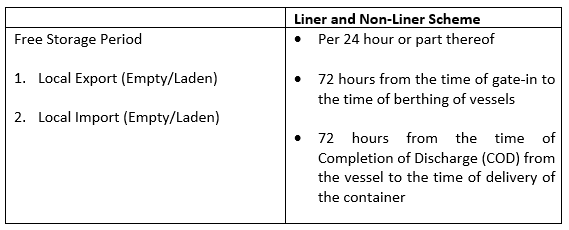
- For Import (JP – JP) transshipment container, the free storage period commences from the Completion of Discharge (COD) to the Actual Time of Berthing (ATB) of the 2nd carrier in JP
- For Export (PSA – JP) transshipment container, the free storage period commences from the gate-in of the container to the ATB of loading carrier
There is 178,000 m2 of warehouse space and 480,000 m2 of open storage available for storage of cargoes and containers.
The following types of storage are available in Jurong Port:
- Local Storage
- Transhipment Storage
- Short Term Storage
- Long Term Storage
Local storage is for local import and export cargoes.
This type of storage is for cargo that is discharged from vessel or gate-in for shipment. The cargo is placed in transit storage to be either taken out of the port or gate-in awaiting vessel Actual Time of Berthing (ATB).
This storage is applicable for vessel under the liner and non-liner scheme.
Liner Scheme
- For Import – Free Storage Period (FSP) for the first 72 hours from the Completion of Discharge (COD) time to creation of Delivery Note (DN) transactions
- For Export – FSP for 72 hours from first Unloading Advice (UA) to ATB of vessel
Non-Liner Scheme
- For Non-Liner vessels, the FSP is 6 hours
- For Import – The FSP is from the COD to the creation of the DN
- For Export – The FSP is from the transaction of the first UA to the ATB
- Unauthorised storage of $2.50/tonne/day is imposed when storage exceed the FSP of first 6 hours
Transshipment storage is for cargoes that land in Jurong Port on transit to be loaded back to 2nd carrier for the final port of discharge.
Under liner term, 14 days (336 hours) Free Storage Period (FSP) is granted. This applies for liner to liner and from liner to non-liner and vice versa.
The 14 days FSP is applicable for both JP – JP as well as PSA – JP.
- For JP – JP, the FSP is from Completion of Discharge (COD) of 1st carrier to the Actual Time of Berthing (ATB) of 2nd carrier
- For PSA – JP, the FSP is from COD of PSA vessel to the ATB of the 2nd carrier in JP. JP will bill the store rent
- For JP – PSA, the FSP is from COD of 1st carrier to ATB of the 2nd carrier in PSA. PSA will bill the store rent
Under non-liner (JP – JP), only 7 days (168 hours) FSP is allowed. This term is applicable for non-liner to non-liner only. After the FSP, unauthorised storage charge of $2.50 per rt is applicable.
- This type of storage for a maximum period of 3 months
- This storage is available for both liner and non-liner vessel
- The storage is only for cargo under local status
- Company (Agent, Consignee/Shipper) is to submit the warehouse storage application in the JP-Online
For Import
The application could be submitted 3 days before the Actual Time of Berthing (ATB) of the vessel. An import Authorised Slip Number (ASN) is required before submission of the storage application.
For Export
The application with an export ASN could be submitted 3 days before the cargo is gate-in.
The 3 days period is to allow the Yard Planning Team to plan the storage request.
Storage Management Team of Operations Planning will review the application and approve based on a by request basis and availability of storage space.

Long Term storage is for a period of more than 3 months to 1 year. For this form of storage request, company can email Jurong Port Customer Service (JPCS) via our Enquiries Form.
Jurong Port will assess each request individually, determining storage allocation according to the specific storage type and priority as appropriate.
- For storage request of 3 months to 1-year PLM will decide on storage area as well as the rate that will be applicable for storage before approval
- For storage request of 1 year or more a Tenancy Agreement will be signed between Jurong Port and the company





